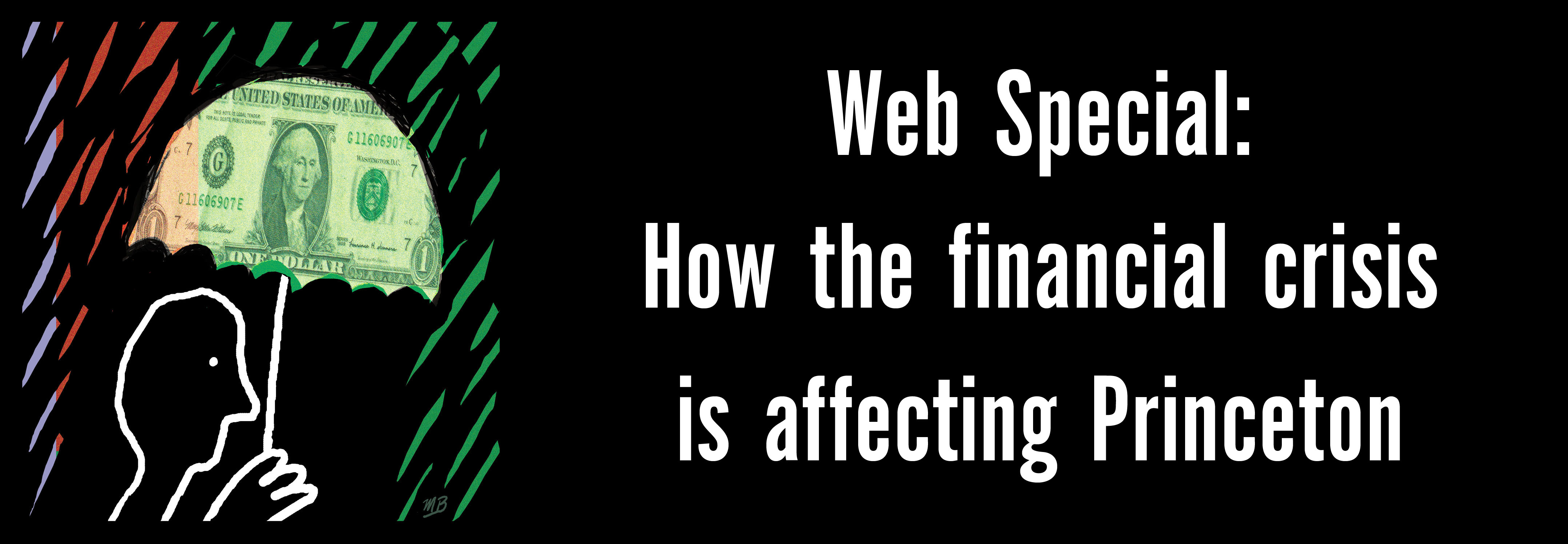How the financial crisis is affecting Princeton
Financial aid rises with the economy’s downturn; stability expected for the budget, Aspire campaign
The University has been forced to increase its financial-aid spending by more than $3 million, and the timing and scope of campus construction projects may be adjusted in response to the financial crisis.
But Provost Christopher Eisgruber ’83 said last month that “Princeton is a steady ship budgetarily,” and Vice President for Development Brian McDonald ’83 said that there is “absolutely no plan” to change the University’s $1.75 billion fundraising campaign, which ends in 2012.
“We have certainly felt the impact of the economic downturn,” said Robin Moscato, director of undergraduate financial aid. “We expect to spend an additional $3 million to $4 million in the current aid budget.” Moscato said half of the additional aid is going to about 50 students who now qualify for the first time, and the other half will meet the increased needs of about 200 students whose families “are experiencing job losses, reduced incomes, erosion of savings, and other financial difficulties.”
The 50 additional students brings the total number of undergraduates on financial aid to about 2,700, or about 55 percent of all undergraduates.
Of Princeton’s $87 million scholarship budget, $6.4 million comes from government and outside organizations, and the remaining $80.6 million comes from University sources – the great majority from endowed scholarships.
Students whose family occupations are related to housing and real estate have been directly affected, Moscato said. She said it was too soon to estimate the financial-aid budget for next year, but that Princeton will continue to meet the full need of every student who qualifies for aid.
At the Nov. 3 faculty meeting, President Tilghman said that fulfilling financial-aid requests would be the University’s “highest priority” in the current economic climate. While Princeton does not anticipate budget cuts in 2008-09, Tilghman said, “We shouldn’t underestimate the fact that this is a very serious economic downturn.”
In response to the downturn, the University is “making painful but necessary distinctions” in funding capital projects, Tilghman said, and is moving forward on the ones that are essential to Princeton’s academic mission while delaying those that are less pressing. She was not specific in her evaluation of capital projects, but said that decisions would be made soon.
Among students, it’s not hard to find seniors who are agonizing over post-graduation employment and the daunting process of hunting down jobs in the financial sector.
“I would say that for most students, it’s not so much a direct impact on their wallets, as their viability in the job market, which is somewhat more scary,” said Andy Chen, a senior from Los Angeles who is majoring in sociology.
Chen, who had considered consulting but now plans to pursue his dream of graphic design, said the changing job market “makes those of us who don’t want to go into consulting or banking feel more confident about our decisions, and justifies the liberal-arts education as providing a broader array of options.”
Some students said they were reining in their spending, changing fall-break travel plans, and eating out less.
“It’s definitely been affecting me and my friends,” said Jerome Jackson ’11, who works at the welcome desk in Frist Campus Center in a University work-study job. “I’ve seen stuff happening with my friends – cutting back on frivolous spending like going out to dinner, trying to conserve their money and spend it more smartly.”
Jackson said that the “staycation” phenomenon he witnessed in the summer has increased markedly in recent months, with students cutting back on travel plans.
At Tomo Sushi, a popular student lunch spot on Nassau Street, owner Thai Lin says he has noticed a marked downturn in traffic in the last six months.
Some of the student agencies also have seen a downturn in business. Bobby Morris ’10, who runs the Student Laundry Agency, said the number of student customers dropped from 180 to 130 after he raised the fee from $440 to $475 for the year.
The Princeton Water Agency, which delivers water coolers and bottled water, has about 50 fewer customers than it had last semester. “It’s the nature of college students in general to try and save money, and everyone is trying to cut corners on spending money right now,” said Brianna Moreno ’09, who runs the agency.
Student groups are feeling the pinch as well. The Tigertones – an a cappella group known for its global tours to venues such as Paris, Geneva, Morocco, and Bermuda – are planning a local tour this fall. “In this economic downturn, it’s a daunting task even to plan a tour here in the U.S.,” said Vinnie Murthy ’10, Tigertones president. “This fall break, we’ll be driving up the Northeast, performing at schools in Connecticut and Boston.”
Princeton officials are carefully monitoring the impact on its budget of the turmoil in the financial markets, Eisgruber said. “The University is obviously not insulated from serious negative developments of this kind,” he said.
But he added: “We do not expect to have to make short-term adjustments that would compromise the University’s long-term priorities,” and said that the only major area where key changes may be made is in the timing and scope of construction projects.
McDonald told The Daily Princetonian that the Aspire fundraising campaign had been designed with a “realistic total” and that the University did not expect the economic picture to be “sunny all five years.” As of Oct. 20, the campaign had raised $925 million of the $1.75 billion goal.













No responses yet